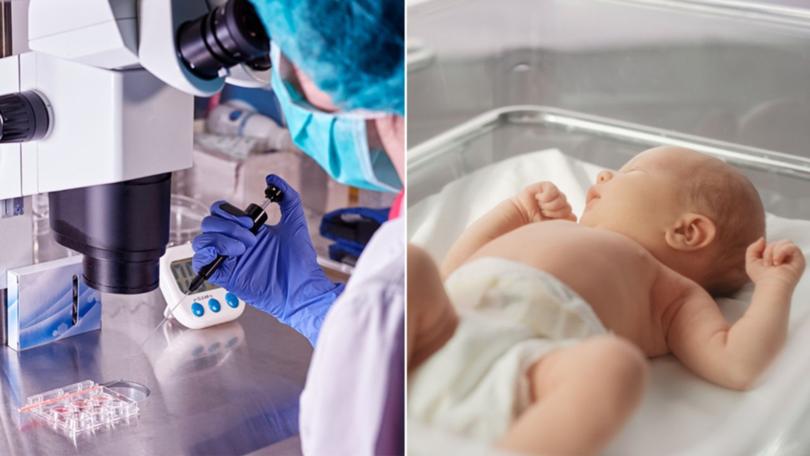New study reveals higher risk of heart defects in babies conceived through assisted reproductive technology
‘These procedures are not without risks.’
Babies born via assisted reproductive technology such as IVF are far more likely to suffer major heart defects than those conceived naturally, with that risk blowing out to twice that of other babies if the infant was born as a part of a multiple birth.
There are so far about 10 million people worldwide who have been conceived through assisted reproductive technology (ART).
Now a new study, one of the largest of its kind to date, has found those people were 36 per cent more likely to have been born with a major heart defect, than babies conceived naturally.
Sign up to The Nightly's newsletters.
Get the first look at the digital newspaper, curated daily stories and breaking headlines delivered to your inbox.
By continuing you agree to our Terms and Privacy Policy.And if the child was born via ART as a twin or other multiple birth, they are more than twice as likely to have a heart defect than individual babies born without ART.
That risk of a congential heart defect was similar regardless of whether the ART used was in vitro fertilisation (IVF) or intracytoplasmic sperm injection (ICSI).
It was also similar regardless of whether the embryos were fresh or frozen before they were transferred to the uterus.
The study published in European Heart Journal on Thursday, one of the largest of its kind, compared 171,000 live-born children conceived by ART in Scandinavia over three decades, to the 7.7 million born who were spontaneously conceived (SC) within that timeframe.
The lead study author, University of Gothenburg in Sweden Professor Ulla-Britt Wennerholm said the findings build on a growing understanding of the links between ART-conception and health conditions.
Variables such as the mother’s age and medical history, and whether the mother smoked during pregnancy, were all factored into the study.
And Wennerholm said the study findings could suggest a potential link between the heart defects and factors related to parental infertility, rather than being caused by the treatments themselves.
“We already know that babies born after ART have a higher risk of birth defects in general; however, we have found a higher risk also in congenital heart defects, the most common major birth defect,” she said.
“The fact that the risk of heart defects is similar regardless of the type of assisted reproduction used may indicate that there is some common factor underlying infertility in parents and congenital heart disease in their babies.”
‘Not without risks’
Dr Nathalie Auger from the University of Montreal Hospital Research Centre in Canada wrote in an editorial published in European Heart Journal to accompany the study, noting that finding out exactly what causes the defects is the next question to answer.
“Patients who use assisted reproductive technology tend to differ from the general population. These patients may have underlying morbidities that affect both fertility and the risk of heart defects,” she said.
“While most neonates born after assisted reproductive technology are healthy, these procedures are not without risks.
“The next direction of research will need to focus on determining if assisted reproductive technology does indeed have a direct effect on heart defects.”

The risk of being born with the heart defect was still “low” but increased in cases of multiple births, NSW Stem Cell Network director and Consultant Endocrinologist Bernard Tuch said.
While the absolute risk for babies born through SC was 1.15 per cent, the risk for babies born through ART was 1.84 per cent. Those figures increased to 1.62 per cent versus 2.47 per cent when considering multiple births.
That means the risk of heart defects in ART-conceived babies born in multiples is twice as likely as the risk for babies born singularly through SC.
Wennerholm said the research will help the world prepare for the spike in health issues related to ART, as the technology proliferates worldwide.
“Congenital heart defects can be extremely serious ... so knowing which babies are at the greatest risk can help us diagnose heart defects as early as possible and ensure the right care and treatment are given,” she said.
“More and more people are conceiving with the help of assisted reproductive technology, so we might expect to see increases in cases of congenital heart defects worldwide.”
Originally published on 7NEWS
